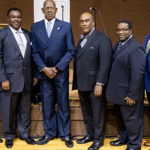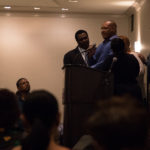WACO— A Baylor University student has captured a time when slaves scrabbled for whatever food they could find, grow or collect from their white owners and when songs held coded messages for fugitives who sought escape to freedom via the Underground Railroad.
 Myria Bailey WhitcombThe legacy of her ancestors enthralled, saddened and heartened Myria Bailey Whitcomb, a former re-enactor at a Pennsylvania church that was a safe house on the Underground Railroad.
Myria Bailey WhitcombThe legacy of her ancestors enthralled, saddened and heartened Myria Bailey Whitcomb, a former re-enactor at a Pennsylvania church that was a safe house on the Underground Railroad.
She wanted to share the heritage and spiritual strength of those times. So, she embarked on assembling an unlikely mixture—lyrics of such spirituals as “Wade in the Water” and “Go Down, Moses,” memories handed down from those who lived through an unforgettable chapter of American history, and recipes with ingredients such as hog’s head, ham hocks, collard greens, chitlins and oxtails.
In An African-American Cookbook, many of the 400-plus recipes exemplify turning something undesirable into something good—just as tragedy turned into triumph for slaves who escaped to liberty long before and during the Civil War, thanks to those who helped them along the way.
“I wanted to honor the Underground Railroad,” said Bailey Whitcomb, a student at Baylor’s Truett Theological Seminary and the Baylor School of Social Work. “This is more than a cookbook. It’s a history book.”
The book includes quotations by “the famous and the not-so-famous,” she said. Those individuals range from abolitionist Frederick Douglass and Harriet Tubman—an African-American “conductor” who escorted more than 300 slaves to freedom—to elderly members of Bethel African Methodist Episcopal Church of Lancaster, Pa., who passed on tales of slavery and freedom handed down from previous generations.
 One member, Elizabeth McGill, recalled how her mother told her three children stories of “the old times” and read from the Bible. She recalled, too, how her mother used flour to patch wall cracks to keep out the cold in a home not much improved from slave quarters.
One member, Elizabeth McGill, recalled how her mother told her three children stories of “the old times” and read from the Bible. She recalled, too, how her mother used flour to patch wall cracks to keep out the cold in a home not much improved from slave quarters.
“We had no ceiling and no water,” McGill said. “It was normal to look at the stars at night.”
In Pennsylvania, Bailey Whitcomb—who serves as co-pastor of a church in Athens with her husband, Jeffrey—served as writer, director and actor of “Living the Experience,” an interactive re-enactment of the Underground Railroad.
Sign up for our weekly edition and get all our headlines in your inbox on Thursdays
In her book, lyrics of spirituals serve as prefaces to recipe sections.
“Such spirituals often carried code languages for enslaved Africans,” she said. “In ‘Wade in the Water,’ the code was to go to the river, where water would cover the fleeing Africans’ scent and tracks, making it difficult for bloodhounds to track them.”
Individuals or “conductors” in the network provided food, money and “stations”—hiding places in homes, barns and out-of-the-way spots—as well as aid in nighttime travels, sometimes by boat, sometimes by train and often on foot.
Besides the conductors, “there were free communities of Africans that had never been enslaved, so they were a wonderful drop-off” for escapees, Bailey Whitcomb said. Many who championed the effort helped escapees find jobs, even providing letters of recommendation.
As for the recipes, many included food owners gave their slaves.
“They were given what was undesirable by the white people, but they worked,” Bailey Whitcomb said. “Chitlins and pigs’ feet. They made it, and it tasted gourmet.”
Myria Bailey Whitcomb will present a free one-woman performance of a cappella spirituals about enslavement and the Underground Railroad at 5:30 p.m. Wednesday, Feb. 26, at Seventh & James Baptist Church, 602 James Ave. in Waco.














We seek to connect God’s story and God’s people around the world. To learn more about God’s story, click here.
Send comments and feedback to Eric Black, our editor. For comments to be published, please specify “letter to the editor.” Maximum length for publication is 300 words.